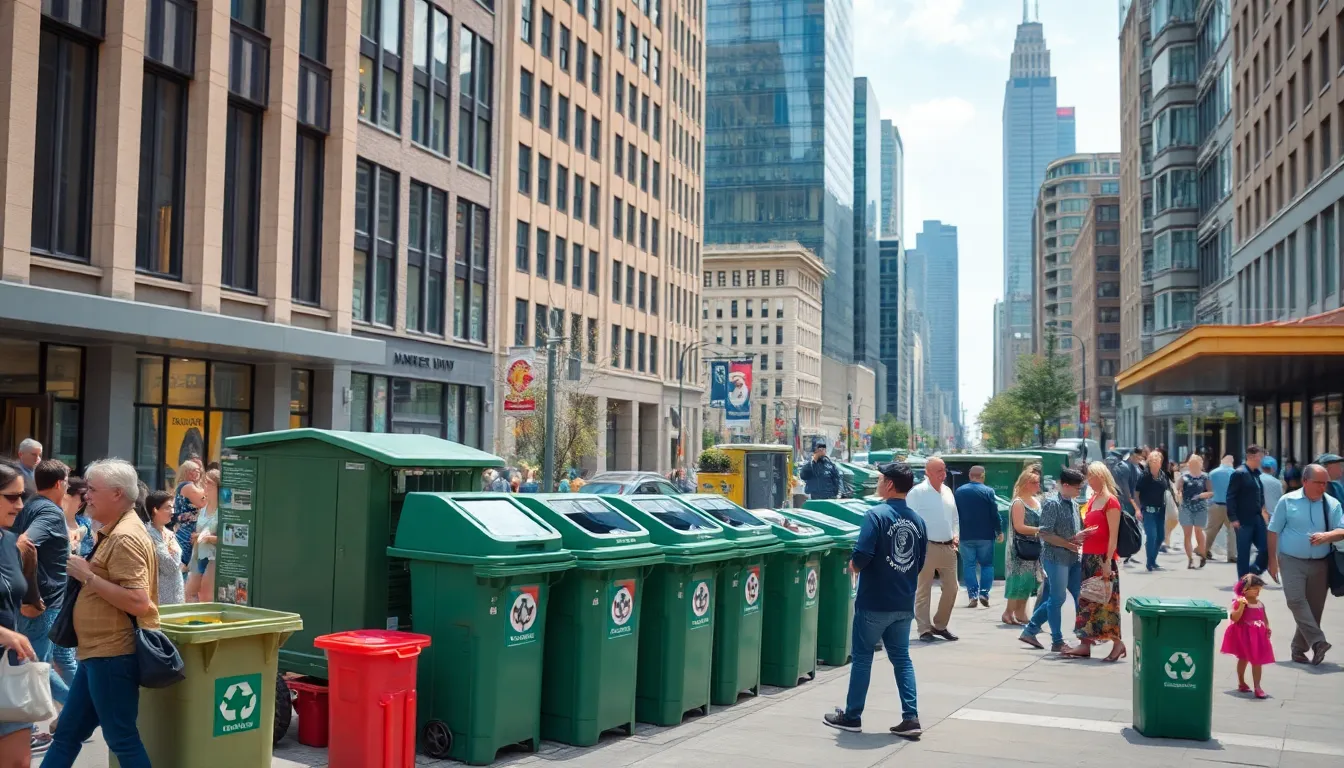In a world overflowing with trash, smart waste management is the superhero we didn’t know we needed. Imagine a future where garbage doesn’t just pile up but gets transformed into valuable resources. It’s not just about cleaning up the planet; it’s about turning waste into wealth. With innovative technology leading the charge, cities are finally putting their trash to work instead of letting it gather dust—or worse, stink.
Table of Contents
ToggleOverview of Smart Waste Management
Smart waste management refers to using technology and data to optimize waste collection and disposal processes. This approach aims to reduce waste generation and increase recycling rates, all while minimizing environmental impact.
Definition and Importance
Smart waste management involves an integrated system that utilizes data analytics and technology to manage waste more efficiently. This system helps cities reduce the volume of waste sent to landfills. It also maximizes resource recovery, turning trash into useful materials. Efficient waste management supports sustainability and ensures cleaner environments for communities. As cities grow, addressing waste management challenges becomes essential for public health and ecological balance. By adopting smart solutions, communities can improve waste processing while encouraging responsible consumption.
Key Technologies Involved
Several key technologies drive smart waste management solutions. IoT sensors play a crucial role by monitoring waste bin levels in real time. These sensors help determine optimal collection routes, reducing operational costs. Data analytics platforms process waste generation data, identifying patterns and enabling better decision-making. AI algorithms contribute by predicting waste trends and improving resource allocation. Additionally, mobile applications enhance user engagement, allowing residents to report overflowing bins or track waste services. Each of these technologies collectively streamlines waste management operations, creating a more efficient and sustainable framework.
Benefits of Smart Waste Management

Smart waste management presents numerous advantages, particularly in improving environmental sustainability and economic efficiency.
Environmental Impact
Implementing smart waste management significantly lessens the negative effects of waste on ecosystems. By optimizing collection routes, cities reduce greenhouse gas emissions from waste transport. Utilizing IoT sensors allows for real-time monitoring of waste levels, helping to ensure timely pickups and prevent overflow. Advanced analytics identify trends in waste generation, enabling authorities to promote recycling and composting initiatives. Enhanced recycling rates reduce landfill inputs, conserving natural resources and decreasing pollution. Investment in smart technologies supports cleaner communities and fosters a healthier urban environment.
Economic Advantages
Smart waste management generates economic benefits across multiple sectors. Efficient waste collection reduces operational costs, resulting from fewer trips for garbage trucks. Data-driven decisions increase resource recovery, turning waste into reusable materials and creating market opportunities. Job creation stems from the growth of the recycling and waste management industry, which employs skilled workers in various roles. The long-term savings from reduced landfill use and environmental recovery can offset initial technology investment costs. Businesses that engage in sustainable waste practices often enjoy enhanced public perception, contributing to customer loyalty and brand value.
Challenges in Implementing Smart Waste Management
Smart waste management faces several challenges that hinder its effective implementation. Technical barriers and public acceptance significantly impact the progress of these innovative solutions.
Technical Barriers
Technology integration presents a major obstacle in smart waste management. Various cities lack the necessary infrastructure to support advanced systems, causing inefficiencies. Data security concerns often arise when implementing IoT sensors, raising fears about privacy and misuse. A shortage of skilled workers impedes the maintenance and operation of smart waste technologies. Software compatibility issues further complicate the integration of different platforms, making it difficult to achieve seamless communication. These technical challenges can delay adoption, forcing cities to rely on outdated waste management practices.
Public Acceptance
Public acceptance plays a vital role in the success of smart waste management initiatives. Many individuals remain unaware of the benefits smart systems can provide, leading to resistance. Educational campaigns are essential to inform citizens about how technology improves waste management. Trust in technology also affects acceptance; skepticism about data collection practices can hinder community participation in these programs. Stakeholder engagement is crucial for building support. When residents see tangible benefits, such as cleaner streets and reduced waste, acceptance increases, making it easier to implement innovative solutions.
Case Studies of Smart Waste Management
Smart waste management showcases successful strategies that cities worldwide have embraced. Innovative technology plays a key role in these examples, offering practical solutions to waste challenges.
Successful Implementation Examples
Barcelona’s smart waste management system utilizes sensors in bins to optimize collection times, reducing costs by 25%. Amsterdam has adopted a similar approach, employing IoT devices to monitor waste levels and improve recycling rates by 30%. In Singapore, garbage trucks equipped with real-time tracking ensure efficient routes, resulting in a 20% reduction in fuel consumption. Each of these cities demonstrates how technology can streamline operations, enhance efficiency, and create a cleaner environment for residents.
Lessons Learned
Cities that implement smart waste management learn valuable lessons about community engagement. In Porto, public buy-in significantly improved when residents actively participated in monitoring waste levels. Data security emerged as a common concern, underscoring the necessity for transparent data practices. Training for personnel has proven essential, as well-trained staff are crucial for maintaining system effectiveness. By addressing these aspects, cities can enhance their smart waste initiatives and pave the way for further innovations.
Future Trends in Smart Waste Management
New technological advancements redefine smart waste management as a vital force for urban sustainability. Innovative trends promise to enhance efficiency and effectiveness across waste management systems.
Innovations on the Horizon
Emerging technologies such as blockchain secure data integrity, boosting trust in waste management processes. As artificial intelligence advances, predictive analytics improve collection schedules based on real-time data, optimizing routes and reducing costs. Integration of drone technology can facilitate waste monitoring in hard-to-reach areas, enhancing oversight. Additionally, smart bins equipped with sensors automatically notify service providers when they require emptying, preventing overflow and improving user experience. These innovations create significant potential for streamlining waste management operations.
Potential for Sustainability
Increased adoption of circular economy principles aims to minimize waste generation and maximize resource recovery. By focusing on efficient recycling and composting practices, cities can significantly cut landfill waste. Smart waste management technologies reduce greenhouse gas emissions by optimizing collection routes and frequencies. Enhanced community engagement ensures residents actively participate in recycling programs, reinforcing sustainable habits. Investments in smart technologies lead to economic benefits such as job creation in emerging sectors focused on sustainability. Together, these factors contribute to long-term environmental benefits critical for urban resilience.
Smart waste management stands as a pivotal solution in the quest for sustainable urban living. By leveraging technology and innovative practices, cities can transform waste into valuable resources while minimizing environmental impact. The integration of IoT sensors, data analytics, and community engagement fosters a more efficient waste management system.
As urban areas continue to grow, embracing smart waste management will be essential for enhancing public health and ecological balance. Overcoming challenges like technical barriers and public resistance is crucial for success. With continued advancements and community involvement, the future of waste management can lead to a cleaner, greener world.






